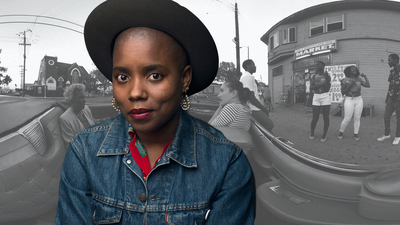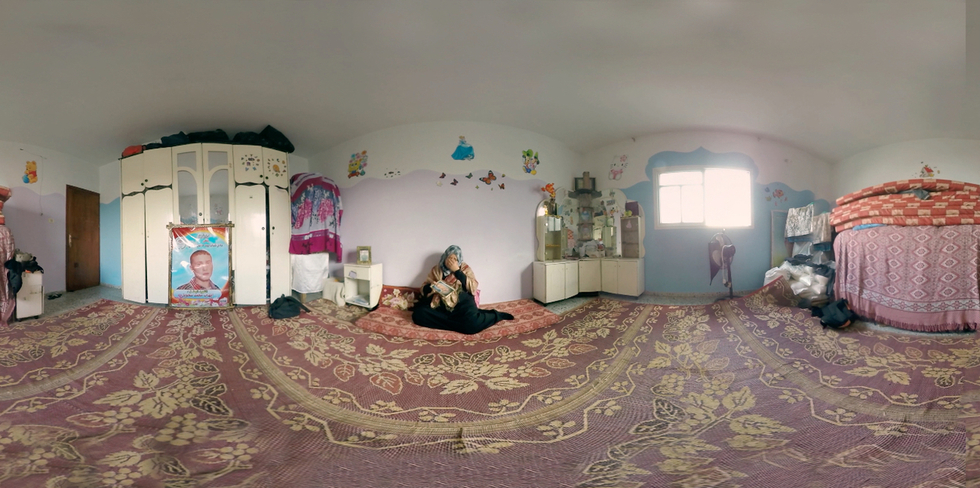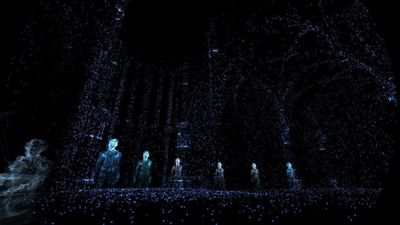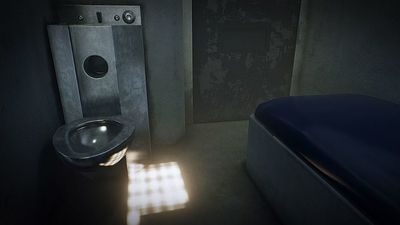
BY MELINA GILLS |
Gabo Arora on Making VR with Vrse.works and the United Nations
Gabo Arora, creative director and senior advisor for the United Nations, discusses MY MOTHER'S WING, which will screen at the Tribeca Festival Hub, from April 18-23.

Gabo Arora is presenting the North American premiere of his virtual reality film My Mother’s Wing at this year's Tribeca Festival Hub. (Buy tickets here.) Co-created with director Ari Palitz, the documentary follows the surviving family members of two young boys who lost their lives to Israeli bombs while taking refuge in a United Nations school designated as a shelter. A voiceover by their eight-months-pregnant mother, Somaia Okal, guides the viewer through the ruins of Gaza while also evoking hope for change through solidarity.
"I want to make something artistically fulfilling that will pass the test of time," says Arora. "I don't think about it as just an advocacy tool. Are we developing this story in a way that is going to be transcendent? I'm more concerned that something resonates with its craft than just the message. We want to play to people's subconscious and the poetry. We're trying to speak to the unspoken inside you. That's what really drives me."
Arora began making VR projects after meeting Chris Milk, the field's great pioneer, at a party hosted by common friends, the rock band U2. "Chris has done music videos with them, and I've done anti-poverty work with Bono on the ONE campaign,” says Arora. "Those kinds of worlds collide at U2 parties." Shortly after that chance encounter, the Jackson Heights native visited Milk at his New York apartment, where he was shown the demo of the virtual reality pioneer's collaboration with Beck, "Hello Again," a groundbreaking 360° concert experience. Arora immediately recognized that he was seeing the future, and he wanted the UN to help shape its potential.
Milk is now Arora's mentor and regular collaborator. My Mother's Wing is the third film he's produced with Milk's studio Vrse, in partnership with the United Nations. The first two, Clouds Over Sidra and Waves of Grace, have received widespread acclaim. "We want to make sure that what is being done in VR is done on issues that really matter to all the worlds' people," says Arora.
As the UN's creative director and senior advisor, Arora was able to convince its somewhat hesitant leaders to create a lab dedicated to VR projects. "At the UN, a lot isn't seen as cutting-edge or on the forefront with technology or storytelling, and I was always pushing for that to change," says Arora. "Especially with younger audiences—they have a bullshit detector for what isn't authentic. Virtual reality lends itself to authenticity because it's a lot harder not to be real in that medium. You're so exposed and things are out of your control. You can really build empathy on these tough issues. [My Mother's Wing] is pushing the hypothesis to the extreme."

Collaborating with the UN granted Arora privileged access to Gaza, a place mostly shut out from the rest of the world. The shooting crew consisted of Arora, director of photography Barry Pousman, a driver, and a UNICEF representative who helped Arora communicate with Gazans. "Gaza is like this beach with a huge fence around it: a no-man's land,” says Arora. "There was a lot that we couldn't capture because of security. We wanted to get across that sense of fear, entrapment, boredom, and the cycle of violence. I do think the occupation is wrong, and I don't think that's controversial. Even a lot of Israelis believe that. I'm not Muslim or Jewish, I don't necessarily have a stake. I'm just trying to create compelling content and shed light on the most vulnerable populations of our time."
Documentary filmmaking can be ethically ambiguous, and My Mother's Wing certainly walked that fine line. Arora found himself in some "horribly awkward situations" while asking the mother to reenact past events. At one point, he requested that she mourn her children at their graves in front of his camera. Some bystanders angrily scolded him, saying, "Her children are martyrs,” and, "She's not a puppet." "It makes you question your role as an outsider," says Arora. "Thank God I'm from New York, and I'm a hustler and will get things done. I'm from the school of Errol Morris and Werner Herzog. I think people who understand film know that none of this is possible without crafting."
Although its production was, at times, emotionally taxing, My Mother's Wing promotes hope in the midst of despair. "It's not just about the trauma," says Arora. "Through VR, you're able to walk in [the Gaza residents'] shoes. There's always more to them than misery. This family made dinner for us, and we played around. They feel solidarity with other Palestinians and don’t see themselves as special in their situation. They feel compelled to help each other out. After the mother's loss, it was about her therapy with other women and seeking to be strong for their children. It reminded me of being in New York City during 9/11 and the solidarity that comes out of being in a crisis. When you don't have that, you get into your petty concerns and forget to be grateful. People there are grateful and sensual. It's an incredible privilege to witness."
Intrigued by virtual reality? Click here to learn about all of the VR and innovation projects that will be at the 2016 Tribeca Film Festival, taking place April 13th to the 24th.


